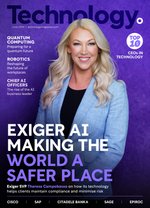
Siddharth Rajagopal
Chief Architect EMEA at Informatica
Migrating to the cloud could result in myriad benefits for businesses who are seeking to bolster their digital transformation strategies.
Increased cloud adoption can indeed result in transformative savings in resource, maintenance and real estate costs. Likewise, businesses can optimise their workloads with technologies such as artificial intelligence (AI) to offer better services to their customers.
With this in mind, Siddharth Rajagopal, Chief Architect EMEA at Informatica, speaks about what businesses should consider when migrating to the cloud, in addition to how he envisions generative AI (Gen AI) transforming enterprise growth.
How can businesses best balance AI innovation with incoming regulations?
“We will likely see a divergence in how countries across the globe regulate AI. This could look like different variants of the same policy that are loosely based on the EU AI Act. But large, multi-national organisations will not be able to afford to do AI regulation on a siloed project-by-project, country-by-country basis. It is too complex.
“Instead, they will need to consider how AI regulation translates into policy and put solid foundations in place that can be easily adapted for individual regions. For example, regulators across countries are showing an appetite for transparency.
“Organisations will need to demonstrate how they are using AI safely and responsibly, and be able to easily answer why their AI model has made a certain decision. The onus is on organisations themselves to understand what the heritage and lineage of data inputs were, ensure that the data utilised was high quality and illustrate how AI acted to generate a particular outcome.
“Only by taking this approach can they balance AI innovation with compliance.”
How can companies best migrate to the cloud?
“When organisations make the decision to migrate to the cloud, they’re taking the first step to realise the transformative power of their most valuable assets – their data and AI.
“The best place to start is to define your end state and business goals which will enable you to select the right tools and solutions. Whether you’re moving existing on-premises data or creating a new data warehouse or data lake, we’d recommend you take a cloud-native data management approach, particularly one that not only meets your current needs but that can adapt to your future requirements.
“You should ensure whatever solution you select has multi-cloud support and can work as an ecosystem with the rest of your cloud components. For example, you should be able to leverage multi-cloud infrastructure, and integrate with different data storage and compute capabilities in a federated setup.
“Other key steps as you migrate to the cloud include:
“Cataloguing your data to get insight into what data you have, where it is located, what is currently used, and how that data needs to be protected. It also makes it easier to find and access specific data as required.
“Standardising and cleansing your data. Focusing on data quality and governance before you move to the cloud is highly important as it will reduce the preparation work you need for cloud analysis. Having the ability to cleanse, standardise and enrich all data without coding using data quality rules means your data users can trust the data they receive and analyse.
“Managing your metadata. Metadata management is key to automating the process of moving data into your cloud data warehouse or data lake. It simplifies discovering, tagging, relating and provisioning your data. Being able to collect metadata from across all your enterprise systems, curate it and augment it with business context is a crucial step in the cloud migration journey.”
What are the opportunities and risks associated with cloud migration? How do businesses mitigate these?
“Successful cloud migration can unlock a multitude of benefits, from agility and scalability, to cost optimisation and rapid innovation. However, it is also important to acknowledge the challenges of migrating large amounts of data, such as visibility, security, and governance. With data spread across public and private clouds, organisations can also face challenges around the accessibility and integration of that data.
“It is even more complex for large businesses, which may have multiple teams across countries. Delivering subsets of this data to the right team at the right place can be very tricky, and it’s important for organisations to include comprehensive data management in their architectures.
“Often overlooked during migration, the coexistence of old and new cloud systems and data landscapes demands a robust approach to data integration and synchronisation. This is especially important for critical data such as master data which acts as a foundation for critical business and operational processes.
“Always remember the old adage: garbage in, garbage out. Data quality must be upheld if new cloud applications are to deliver the high-quality results expected from investment into a cloud migration project.”
How is Informatica seeing cloud migration and Gen AI fuel business growth? Do you have any use cases?
“A robust AI strategy is now a business essential. This brings data management to the fore as without good data, you can’t have an AI strategy. And we are perfectly placed to help organisations to truly innovate with their data and AI on virtually any platform, cloud, multi-cloud and multi-hybrid.
“We’re seeing thriving demand as organisations move to the cloud. In our latest FY 2023 earnings, we saw our own cloud ARR grow 37% year-over-year to US$617m last year. In fact, in the full year, approximately 75% of our cloud new bookings came from new cloud workloads and the expansion of existing cloud engagements.
“A great example of a customer moving to the cloud is The University of Sydney, Australia's oldest university and home to approximately 75,000 students. The University has been a long-standing Informatica customer for two years and has successfully undergone cloud migration projects. To further enable data sharing, enhance the university's experience for their students and faculty and prepare their data foundation to effectively leverage AI, they are using our cloud master data management, data governance, data integration and data quality solutions.”
How is Informatica well-placed to handle mission-critical cloud transactions?
“Everything we do is focused on helping our customers democratise their data, enabling them to modernise and advance their business strategies. We have the only AI-powered data management platform in the market that manages data of any type, pattern, complexity, or workload across any location.
“Our platform approach can grow and expand with a customer’s needs, so businesses won’t find themselves evaluating new solutions in a few, short years. We processed 86 trillion mission-critical cloud transactions in December, growing 62% year-over-year.
“Customers in approximately 100 countries, including 86 of the Fortune 100, rely on us to drive their data-led digital transformation in the cloud.
“We firmly believe that with our unique platform approach to data management, we’re able to help businesses efficiently handle the complex challenges of dispersed and fragmented data.”
******
Make sure you check out the latest edition of Technology Magazine and also sign up to our global conference series - Tech & AI LIVE 2024
******
Technology Magazine is a BizClik brand

